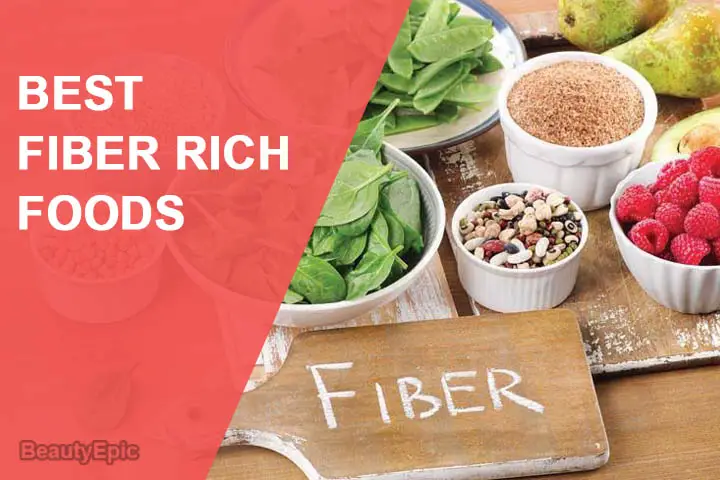
Important: This article is for informational purposes only. Please read our full disclaimer for more details.
Several research and studies have shown that fiber is one of the vital ingredients to help you lose weight and do good digestion. Dietary fiber can help you in gastrointestinal tract may be not digestion, but act as soluble fiber of natural swelling agents which bind with water and provide a long satiety. Soluble fibers also keep your cholesterol and blood sugar levels under control. Here we provide the List of Fiber Rich Foods
40 Fiber Rich Foods You Should be Eating Everyday
I. Cereals High in Fiber
1. Flaxseed
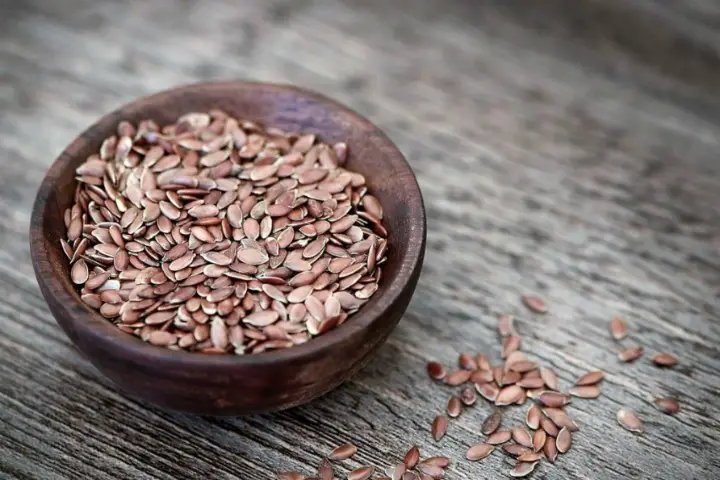
One tablespoon of flaxseed provides 6 grams of fiber
Tip: Kibbled flaxseeds contain a larger surface area so it can swell better.
2. Oatmeal
A serving of oatmeal (50 grams) provides 4 grams of fiber
- 100 Gram of oatmeal have a whopping 370 calories also these calories sometimes varies but do not panic: oatmeal are quietly recommended for athletes and slimmer’s because they help to remain slim and Promotes fat burning.
- Nutrition experts recommend consuming this daily for dietary fiber in the form of grain.
3. Quinoa
A serving of quinoa (gross weight 50 grams) provides 3.5 grams of fiber
Quinoa is not only a good fiber-supplier, also has more positive characteristics important for building muscle. It provides a high-quality vegetable proteins
Quinoa grain contains magnesium and lysine in abundance.
- The mineral magnesium plays a key role in muscle contraction.
- Amino acid lysine is an extremely important for muscle or protein building block.
[ Read: Top 15 Probiotic Foods ]
4. Whole Grain Rye Bread
Two slices of wholemeal bread contains 8 grams of fiber
- With 2 slices of wholemeal bread and a healthy filling cottage cheese with tomato and chives or lean cooked ham, filled in your fiber tanks.
- For wholemeal bread is always 90 percent whole wheat flour or grist in which all the grain ingredients are obtained.
- Particularly in the outer layers of the grain is teeming with healthy ingredients such as vitamins, minerals and natural fiber.
5. Whole Grain Bread
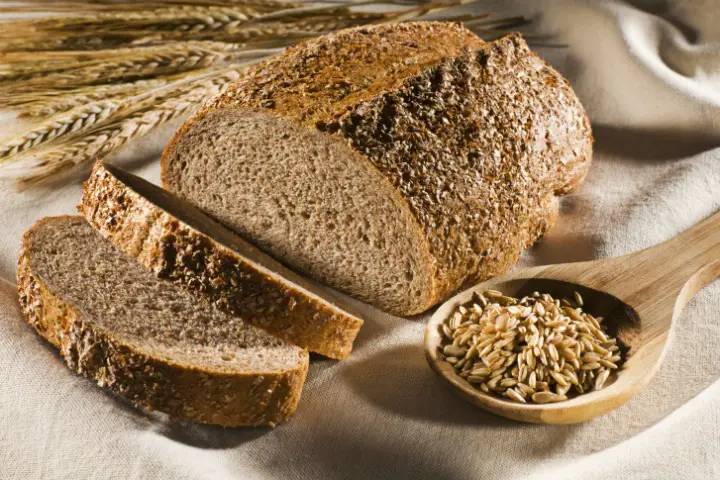
Wholemeal bread provides approximately 4 grams of fiber
- For cereal products there are large differences in dietary fiber.
- Wholemeal bread is a rich source of Vitamin B with twice the fiber as compared to the white bread.
6. Bulgur
A serving of bulgur (gross weight 80 grams) provides 7 grams of fiber
Bulgur is nothing but steamed or precooked partially peeled and sliced wheat.
- The gentle processing bulgur yet tranquil contains valuable wheat germ and is rich in B vitamins, iron and minerals.
7. Cereals (with nuts)
A serving of nut muesli (50 grams) provides an average of 5 grams of fiber
- Muesli has often got hidden unnecessary calories and sugar so we recommend mixing some dry fruits.
- Flakes of all kinds are in the drugstore or supermarket.
- Given a few nuts of your choice or a few more flax seeds , you are done with your cereal mix.
8. Whole Wheat Pasta
All you thought of noodles providing only carbohydrates is wrong.A serving of cooked whole wheat pasta (300 grams) contains 16 grams of fiber
- White flour products (Whether in bread or pasta) are real carbohydrate bombs.
- Even though healthy whole-wheat pasta contains not less calories than regular pasta, but in terms of fiber and protein content whole-grain pasta is clearly ahead.
9. Pumpernickel
A slice of pumpernickel provides 6 grams of fiber
Pumpernickel is a mix of rye flour and dark rye flour are good basis for healthy “sandwiches” for boys’ night.
[ Read: 25 Best Aphrodisiac Foods ]
10. Wheat Germ
One tablespoon wheat germ (10 g) containing 2 grams of fiber
This simply scattered over cereal besides fiber i.e. wheat germ contain high quality, vegetable protein, many B vitamins, vitamin E also plenty of zinc and magnesium.
II. Vegetables High in Fiber
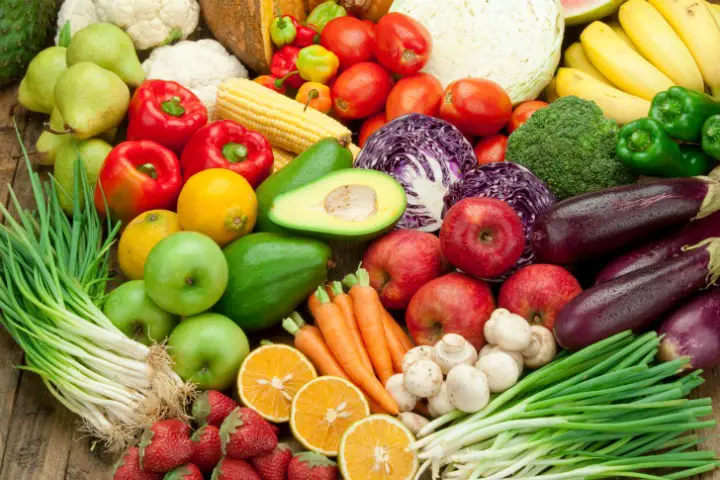
11. Peas
A serving of peas (200 grams) provides 10 grams of fiber
With a portion of peas you can cover one third of your daily requirement of fiber.
12. Mangetout
A serving mangetout (200 grams) provides 10 grams of fiber
- Mangetout peas is different from others kinds of peas.
- They have a very high sugar content.
- Mangetout are rich in proteins, carbohydrates and fiber with pure taste delicious as in a crunchy wok vegetables pan.
13. Kale
A serving of kale (200 grams) enthät 8 grams of fiber
Kale has all kinds of cabbage content.
- It also include highest amount of protein and carbohydrates.
- The high fiber content in it makes it a positive contribution for our digestion.
- The mineral and vitamin combination are additional with potassium, calcium and iron, as well as hematopoietic vitamins from the group of Vitamin B , vitamin C and vitamin E like all the other winter vegetables.
14. Brussels Sprouts
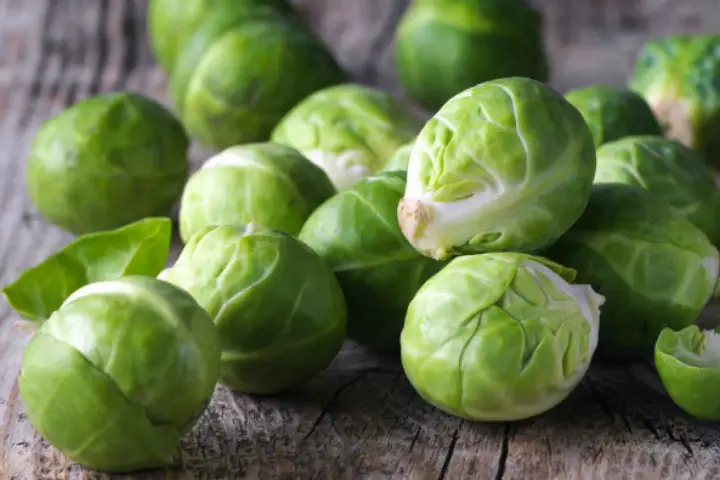
A serving of Brussels sprouts (200 grams) provides 9 grams of fiber
- You will prefer this Brussels sprouts even you got problem with sprouts.
- Carbon rich content in your plate lands a principle of brassicas shine with an arsenal of valuable ingredients such as healthy dietary fiber.
15. Sauerkrart
A serving of sauerkraut (200 grams) enthät 7 grams of fiber
Sauerkraut scores twice in the fiber containing saturate with long and guarantee of controlled peristalsis (muscular activity).
- Lactic acid bacteria naturally occur during making this.
- Act of probiotic by stabilizing the intestinal flora and protects the beneficial intestinal bacteria and combat the harmful.
16. Artichokes
A serving artichokes (100 grams) provides 11 grams of fiber
Artichokes are not only rich in “Ballast”.
- Lower cholesterol content is up to 12 percent.
- This content makes possible everything by artichoke.
- In addition, liver and gall bladder benefit from their bitter substance called cynarin.
[ Read: Top 23 Zero Calorie Foods ]
17. Artichoke Jerusalem
A serving of Jerusalem artichokes (150 grams) provides 19 grams of fiber
- The exotic tuber has all fiber content required for body.
- The soluble fiber with color such as insulin gets swell in the stomach and intestine by binding much water.
18. Eggplant
- Fiber found only in egg plant aids to push our digestion naturally
- By preventing clogging our digestion gets in good condition.
- For example, Eggplants are extremely low in calories and completely convertible in the kitchen for.
19. Broccoli

Broccoli is well in nutrients like Brussels sprouts
- Add a substance called indole-3-carbinol which proved to be an excellent cancer killer in the lab.
- As early in 1997 it is demonstrated this substance is capable to stop the growth of breast cancer.
20. Cauliflower
Cauliflower is low in calories and carbohydrates but still it got much more fiber.
- It is rich in minerals including potassium which is good for heart.
- As well as vitamin K is important for improving in blood clotting.
- With a normal-sized serving of 200 grams, you can meet your daily requirements of boosting immunity with vitamin C.
- The daily requirement is 100 milligrams of serving and cauliflower delivers impressive 146 milligrams.
Mushrooms with Lots of Fiber
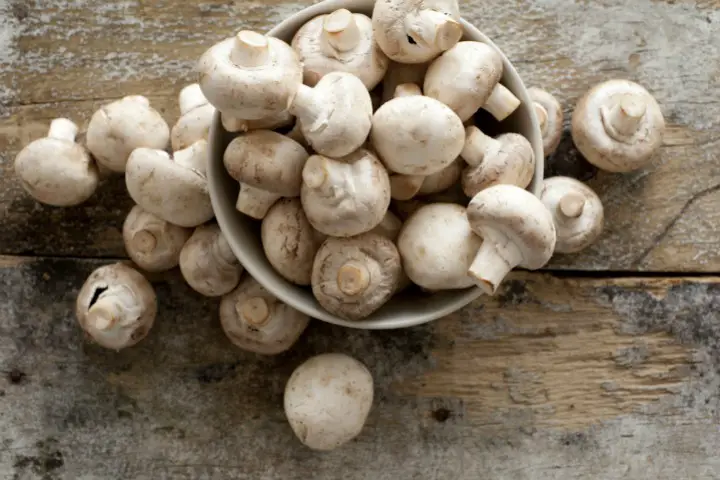
21. Boletus
- Fungi are excellent fiber suppliers but beware in fiber diet fluid intake must be Increased.
- Fiber swell in the intestine and ran deprive the body of water.
- If too little water eaten in combination with many source materials, this Seems rather counterproductive and cause blockages.
22. Oyster Mushrooms
Oyster Mushrooms are low in calories and low in carbohydrates.
- Provides an addition to sufficient “Ballast” above all the important Vitamin B strengthens your nervous system and reduces stress.
23. (Ware) Morels
A serving morels (150 grams) provides 11 grams of fiber
Morels have like almost all fungi but low calories, no fat but healthy vegetable protein and plenty of fiber.
- There are around 12 different morels in Germany and all of them are fit for human consumption but in raw.
- They contain a toxin but can be rendered to harmless by cooking or drying.
24. Birkenpilz
A serving Birch Mushrooms (150 grams) provides 10 grams of fiber
- The birch fungus grows among other kinds of birches.This is uncomplicated Mushroom, but not too familiar
Legumes High in Fiber
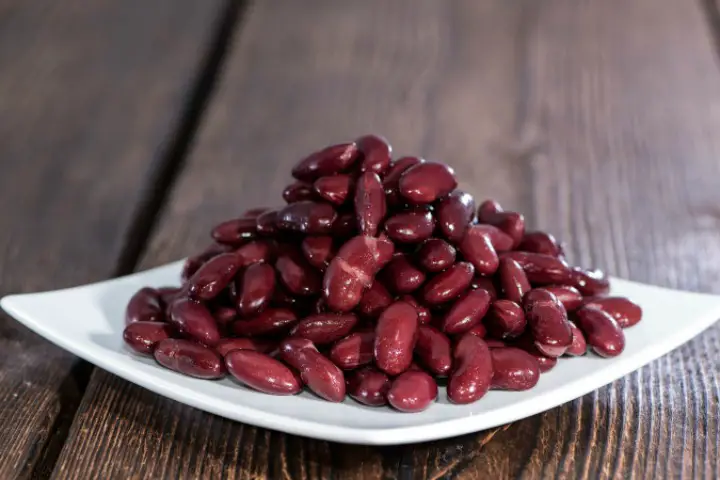
25. Kidney Beans
A serving of kidney beans from a can (125 g) contains 7 grams of fiber
- Does canned food is unhealthy?Nope!
- Hamster of canned vegetables such as beans (pure, not in sauce) always in the pantry.
- They Provides healthy carbohydrates, protein and fiber.
26. Soybeans
A serving of soy (60 g, dry product) provides 13 grams
- The small rounded yellow or green soybeans belong to the group of Legume and are good sources of folic acid.
- They are also rich in healthy polyunsaturated fatty acids, fiber and high quality protein.
- Nevertheless, there is soy in the review containing photochemical – isoflavones suspected to have carcinogenic effects.
27. Lenses
A serving of lentils (60g, dry product) provides an average of 10 grams of fiber
- Lentils won’t contain much healthy fiber but they are good in protein level.
- Low in fat and B vitamins with mineral zinc, which plays for sports but also strengthens your sexual performance in important role.
28. Chickpeas
A serving of canned chickpeas (125 g) provide approximately 9 grams of fiber
Chickpeas with rich fiber content but its high content of vegetable proteins especially for vegetarians and vegans benefit.
- 100g of canned chickpeas contains about 6 grams of protein.
- Raw chickpeas before eating around 12 to 24 must be soaked in water.
- Canned chickpeas can be used immediately after dripping if they are already pre-cooked.
- They are available in any supermarket.
Fruits High in Fiber
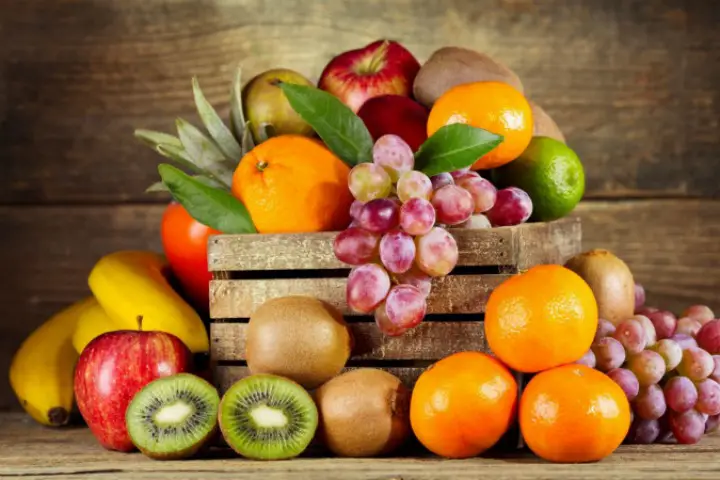
29. Raspberries
A serving of raspberries (125 grams) provides 6 grams of fiber
- Berries are excellent fruits with their high fiber content but above all health benefits, photochemical, which give them inter alia with their bright colors.
- The most important representatives of photochemical in soft fruit the carotenoids and polyphenols protect your body from antioxidants and harmful influences.
30. Pears
A pear provides 5 grams of fiber
- Drivers whoever comes across more often to the bulb also benefits especially from their rich content of lignin.
- Lignin is a dietary fiber which helps to reduce cholesterol in the intestine.
- The substance reduces your love on this fruit, especially the “bad” LDL cholesterol.
- Other foods contains a lot of lignin are flax, linseed or psyllium.
31. Prickly Pear
A prickly pear provides 5 grams of fiber
- Despite of hard (prickly) shell hidden inside lies a sweet fruity and vitamin packed and fiber rich core.
32. Black Currants
A serving of black currants (125 grams) contains 8 grams of fiber
- Currants contain dietary fiber in addition to sufficient pectin especially a lot of vitamin C.
- In local fruits black currant is an absolute vitamin C leader.
- The water-soluble vitamin is pushing our immune system and strictly strengthens the immune system and must be taken daily with food because our body cannot produce itself.
33. Apples
This is one of the most known fibers in pectin, all which is hidden in apples directly under the skin.
- It acts as a natural appetite suppressant because of swelling fiber saturation but beware that too much fiber can be unusual for your intestines.
34. Dried figs
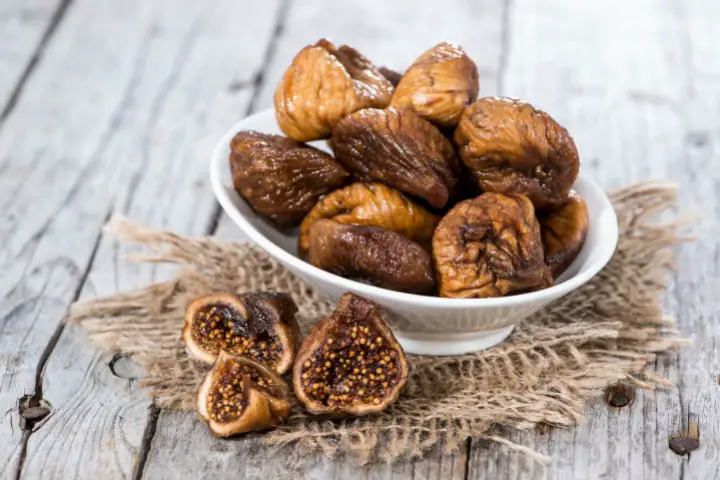
Two dried figs provide approximately 4 grams of fiber.
- Dried figs are delicious and contain a lot of fiber but unfortunately has got quite lot of calories so don’t take much.
35. Dried Plums
Shops serving of dried plums from around 25 grams (about 3-4 pieces) provides approximately 3.5 grams of fiber.
- Dried plums are associated mainly with blockages.
- 100 grams of dried plums to eat throughout the day and your constipation is a thing of the past.
- They really eat only in exceptional cases as much of the dried fruits because they contain massive fructose.
36. Avocados
Half an avocado contains 7 grams of fiber
- Despite of the high fat content reduce avocados “bad” LDL cholesterol level and increase the share of “good” HDL cholesterol in the blood.
- This fiber the stimulate digestion and reduce the risk of cardiovascular disease by lowering cholesterol levels.
37. Blueberries
A serving of blueberries (125 grams) Provide 6 grams of fiber
Blueberries are among the top sources of fiber.
- They are rich in anthocyanins (secondary plant dyes) are designed among other things against cardiovascular disease and diabetes.
Nuts High in Fiber

38. Almonds
One serving of almonds (40 grams) contains 6 grams of fiber
- Almonds are rich in vitamin E and fiber.
- Vitamin E destroys free Radicals in the body and damage cells.
39. Coconut
A piece of coconut (40 g) Provide around 4 grams of fiber
- Coconuts supply many Balla substances but unfortunately a lot of fat.
- The fat therefore is saturate fat with less favorable, as they should enjoy the pulp in moderation.
40. Pecans
A serving of pecans (40 grams) contains 4 grams of fiber
- The high protein content and B vitamins in the Pecan ensure strong nerves and good mood.
- Strong nervous one need the views of calorie and fat content 1 serving of 40 grams gives you over 29 grams of fat and 281 calories.
So here we end with the varied ingredients and food which had high amount of fiber content in them. Almost all the ingredients can be easily procured and budget friendly. Include these in your regular diet plan and see the positive results.
Stay smart! Stay Healthy!
You Might Also Like:
- 25 Best Aphrodisiac Foods That Helps to Boost Your Performance on Bed
- The 10 Healthiest Whole Grain Foods You Need in Your Diet
- The 10 Healthy High-Fiber Foods to Add to Your Diet
- 10 Foods Are High in Insoluble Fiber
- 10 Healthy Foods That Are High in Phosphorus
Images:- 1, 2, 3, 4, 5, 6, 7, 8, 9















